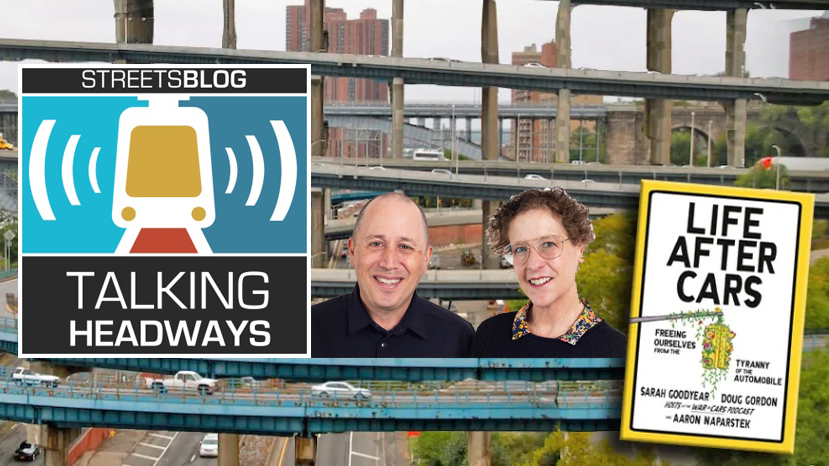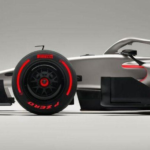Sarah Goodyear and Doug Gordon of The War on Cars podcast on their new book, opposing views, Turtle Jesus and potential off-ramps towards car-free cities.
3:09 PM EDT on October 23, 2025
This week Sarah Goodyear and Doug Gordon of the War on Cars podcast join the show to talk about their new book: Life After Cars – Freeing Ourselves from the Tyranny of the Automobile.
We discuss opposing views, Turtle Jesus and potential off-ramps towards car-free cities.
Scroll past the audio player below for a partial edited transcript of the episode — or click here for a full, AI-generated (and typo-ridden) readout.
Jeff Wood: I also find the idea of like historical off-ramps really interesting, and one of the things that I think about a lot and I’ve talked about on the show a couple of times is the oil crises of the seventies and kind of that time period where several countries, and you talk about this in the book, the Stroget in Copenhagen, as well as Kindermort in the Netherlands, which is during that period, those countries had a chance and they chose to go a different direction in the United States.
And there’s several kind of off ramps that we’ve had over time, and we’ve always chosen the route that goes towards cars. And so like we keep embedding this thing into our lifestyle that really harms us. And these other countries, they’ve gone other directions. And it’s really interesting to think about these off-ramps, these time periods where we could have gone a different direction, but we didn’t.
Sarah Goodyear: Yeah. Well, I mean, I think in the case of the oil crisis, I mean that’s where the forces that I was talking about before, the fossil fuel companies and the way that our government and our politicians have traditionally been beholden to those forces.
That flip that happened at the end of the seventies, when Reagan was elected in 1980. That, that to me is like such an important inflection point that, we had solar panels on the roof of the White House. We had people putting on sweaters and turning off lights and understanding that there’s a limited amount of petroleum products in the world and that maybe we need to figure out how to make it so that fewer people have to burn those in order to get where they’re going.
And then, Reagan happened, and it’s sort of like the 2000 election. How different would our climate trajectory be if those few hanging chads hadn’t been there in Florida and we hadn’t had the Supreme Court decide that election. But I mean, there’s another inflection point that I think is more positive, and that’s the COVID pandemic, and we talk about this in the book, that first of all, everybody learned over the few months before the vaccines, especially like, hey, if we can be outside we can actually see each other again.
So in cities all over the world and all over this country, there were people hanging out outside on the street, sometimes on open streets with outdoor dining, all of that. I think that really did a lot to change people’s vision of the street because it was stuff that they had never actually seen implemented before.
Suddenly. It was implemented. Now there’s been a ton of backsliding and New York didn’t maintain its outdoor dining program the way that many wish it would have, and I hope with a new mayoral administration we’ll be going back to the drawing board on that.
But I think that. If you look at the Great Highway example in San Francisco, you know, I think that we developed a vernacular in this country of opening streets to people, closing them to cars, having fun and realizing that that was possible and hundreds of thousands of people experienced that in real life. And that’s not an opportunity that we’ve had before, and I really think it has changed the mindset.
Doug Gordon: So I’m gonna play devil’s advocate here because we, we do host the podcast together. So I’m gonna argue back with Sarah and say, yes, I think that’s all true. And a lot of people bought cars during COVID.
You know, like you yourself, Sarah, right on the show. And we say if it’s in the book, cars became a form of PPE during the pandemic. Yeah. You saw people like the investment now in drive-throughs. Right. And like the elimination of even the fast food restaurants, like a place to sit down and eat your meal.
You just pick up your food and go. So it’s like, you know, all of these things, it’s like sliding doors, you know? We can sort of pick one path or the other. I do think, to Sarah’s point, you know, I always say the term open streets, that was a real inside baseball urbanist sort of thing. What do you mean the streets open?
I thought it was closed. No one can drive on it. And now you have like entire city departments and public facing programs where regular people are saying like, oh, have you been to the, you know, Berry Street Open Street? Just regular people who are not urban planners or bloggers or podcast hosts.
Talking in, as Sarah said, this, like vernacular that is expanding to more and more people. So, you know, I think like everything in the country, it’s like we, we take a few steps forward, we take a couple steps back. I do think the progress is forward moving, but it’s always and fits and starts.
Jeff Wood is the creator of the Talking Headways podcast and editor of the newsletter The Overhead Wire.
Sign up for our free newsletter
The federal government has obviously lost its trucking mind.
A lot of people have taken on car loans they can't really afford. If only there were other ways for them to get around.
"Even though we do not yet have a set of comprehensive federally enforceable rules telling us how to make our streets and sidewalks accessible, there is still lots of work to do."
China is making big strides to regulate and support slow-speed electric micromobility — and the U.S. could take a page from their book.
President Trump is tapping into an age-old sentiment when he attacks cities. They've endured worse over the years.
Removing parking requirements for new buildings could help thousands of Coloradans who struggle to afford housing — and it might work elsewhere, too.
Covering the movement to end car dependency and improve biking, walking and transit in America.
Sign up for our free newsletter
© Copyright 2025
Made in partnership with Lede












